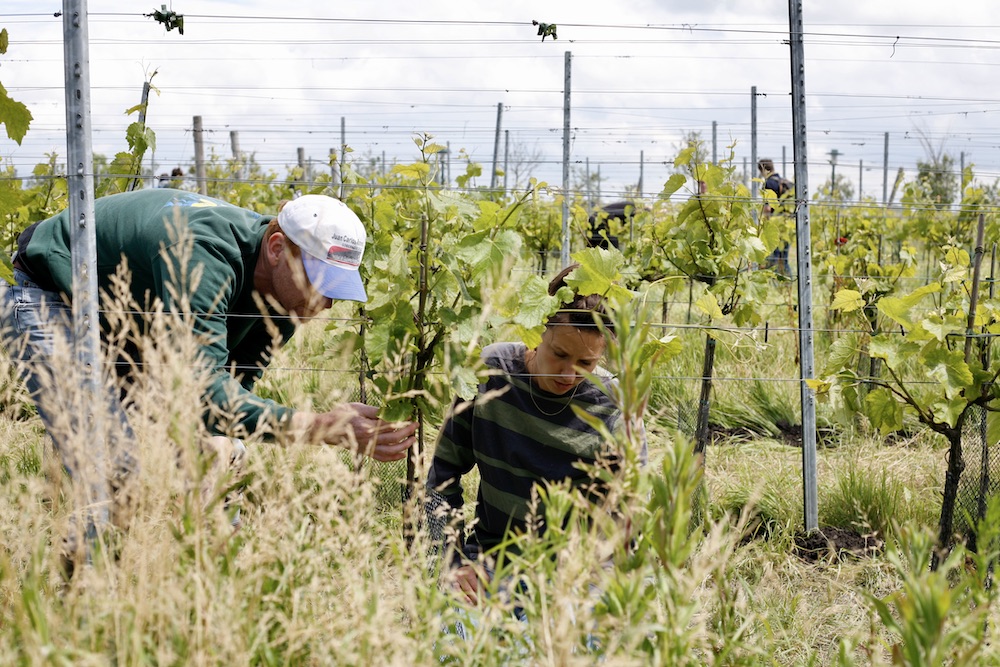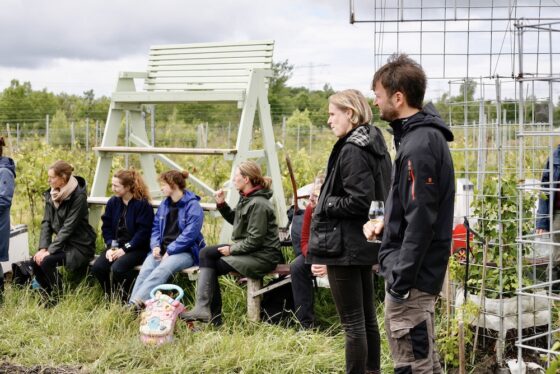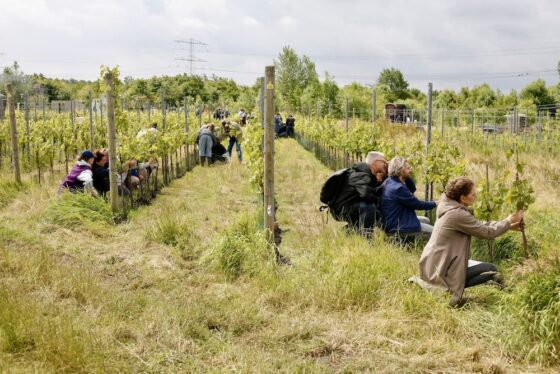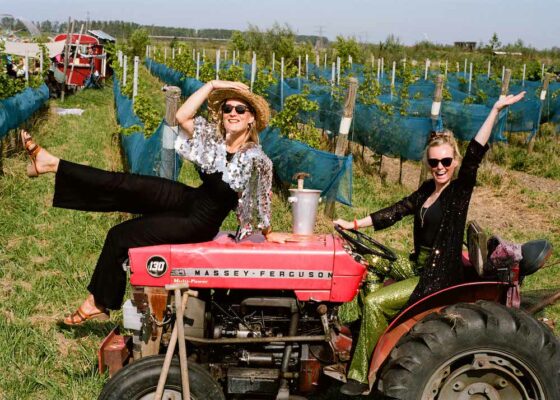Fair shares: Dutch wine lovers sign up to local co-op vineyards
Louis Gore Langton
The Dutch love their wine. They drank over 349 million litres of it in 2022, making it a multi-billion euro market. But people here are also eco-conscious and thirsty for ways to get out of their towns and into the fields.
A new trend is that of collective agriculture, where – for wine drinkers – you can buy a set number of grape vines at a Dutch vineyard (which are increasingly viable as the climate heats up) and commit to helping work the land throughout the year. At harvest time every member gets an equal share of the year’s yield.
One such co-op, Wijntuin Ronja, is nestled in a shared farming space outside Beverwijk. Run by former financial consultant Eise van Maanen and business developer Rubie van Crevel, the project launched shortly before Covid as a way to experiment with viticulture in the Netherlands.
After securing 3 hectares of land on a 30 year lease, 106 people initially joined as growers and planted 880 grape vines. Now, 280 people take care of 3680 vines, through a process of constant experimentation. Last year’s yield came to 340 litres.
On a sunny, rainy Sunday morning in June, Van Maanen and Van Crevel were holding workshops for the vineyard’s members, giving lessons on basic viticulture and what they have been learning through each growing cycle. Several dozen growers were attending in two groups for the workshops, before breaking up into teams for composting and pruning the vines. Before they start, everyone shares a taste of last year’s press.

Under a tent by a small bonfire, vine leaves are passed around with papers explaining biological processes and how they’re impacting the wine’s tastes and textures.
The winery produces several wines, including a sparkling and non-sparkling Souvignier Gris, a Cabernet Cortis and a Johanniter-Muscaris orange wine – a type of white wine where the skins are not removed.
Van Crevel explains to the group – and their children – how woodchips, fungi and oats are aiding plant growth. Organic whey protein is also being experimented with, and the members discuss why and how this works and how it impacts the wine’s taste.
“The gap between the farmer and consumer is big. We want to make it personal and through this scheme we’ve learned a lot about what it takes to make something. It’s tough,” says Van Maanen. “A lot of things can go wrong and most people are no longer aware of what it really takes to grow something. I just can’t imagine anymore how a bottle of wine from Chile can cost €5.”
“People are just craving for more nature in their life. One the one hand, they want to be part of a new wave of production but also to get outside the office – that’s what’s really attractive to people. That, and learning something new, getting closer to the land.”

Facing the weather
Growing wine in the Netherlands is tough. Heavy rainfall badly damages the vines and frost kills buds that have already burst. Last year, Wijntuin Ronja lost roughly 30% of its crop to poor weather conditions.
“But we experience all this together,” says Van Maanen. “When it’s dry or starts raining we get messages of celebration or concern from people on their bicycles in the cities. Some are lawyers at the Zuidas, some are in the Vodafone store, some are traders and some also work as sommeliers in restaurants.”
Anna van Groningen, a member coordinating the composting and pruning teams, says her main motivation for joining was to get out of town and do some work in the fields. She says that for her, and most of the people working with her, political considerations around the farmers’ protests and wider environmental concerns are probably also subconscious incentives to join co-ops.
Out of town
“Most of us are attracted to this I think because it’s a great way to get out of town, meet people and be in nature. Other issues like industrial farming might be a part of it, but I think only unconsciously, it’s not really discussed as part of what we do,” she says.

Another member, Drenske, says she is simply a massive wine enthusiast. Previously, she’d planned to work in French vineyards, and then learned that it could be done in the Netherlands while living in a city.
“At first I thought I’d travel and figure out how it works, because I never knew how to pick a wine and know whether it was any good. And I thought if I travel I’d know, but its very difficult work,” she says.
Environment
“This gives me a chance to play a part and learn without having all the risks on me. I’m a city girl and I’d never move to the countryside again (I’m from a small town) – for me it’s about learning how this all works, and I do know that this is a lot less taxing on the environment.”
Wijntuin Ronja is now getting a big influx of subscriptions, and has been joined by several other co-operative vineyards around the country. Van Maanen says teaming up on farm work of any kind, be it for vegetables or wine, is a great way to teach ourselves where our food and drink comes from and how much industrialised production has changed things.
“The consumer has a lot of expectations that everything will always be there. But through our experience, you can see how tough it is to produce anything. A visit from rabbits or snails overnight can change a lot. I think bringing people together and continuously learning is important, and most of all it’s fun.”
Thank you for donating to DutchNews.nl.
We could not provide the Dutch News service, and keep it free of charge, without the generous support of our readers. Your donations allow us to report on issues you tell us matter, and provide you with a summary of the most important Dutch news each day.
Make a donation